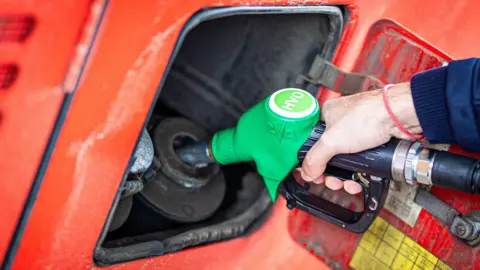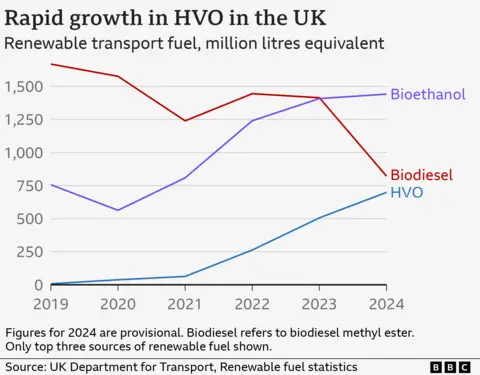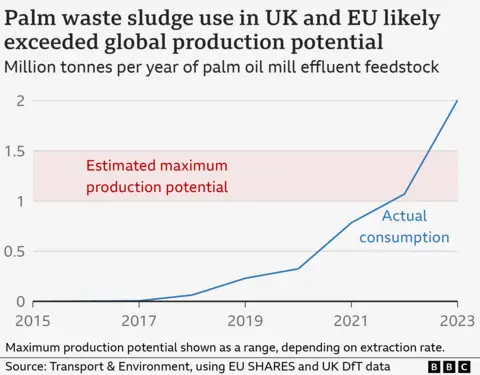UK Green Fuel is investigating fraud allegations around HVO diesel

BBC climate and science
 Alamy
AlamyThe BBC is investigating the fast -growing “green fuel”, HVO Diesel, among the major allegations of fraud in the UK government.
HVO is increasingly popular as a shipping fuel, and to strengthen music festivals and supporters can prevent carbon emissions up to 90%, as it can be made of waste materials such as eating oil.
However, industrial notifications told the BBC that they believe that the large amounts of these materials were not waste, but instead of a fraudulent virgin palm oil.
And the data analyzed by the BBC and shared with the UK’s transport department are more doubtful in one of the basic components in HVO, a material called palm sludge waste.
In 2023, Europe used more of these wastes in HVO and other biofueling more than it was thought to produce the world.
In response to the findings of the BBC, the Ministry of Transport, “they take concerns seriously and work with stakeholders and international partners to gather more information,” he said.
HVO or hydrotherized vegetable oil has recently been called as a wonderful fuel, since it can be used as 100% instead of diesel that reduces planet warming emissions.
According to provisional government figures, the UK consumption rose in 2019 from 8 million liters to approximately 699 million liters in 2024.
Green identity information is largely based on the assumption that it is largely made of waste sources, especially from the food used or waste mud caused by palm oil production.
However, Industrial whistletemists told BBC that they believe that virgin palm oil and other non -waste materials are often used.
Virgin palm oil would be bad news for the planet because it was linked to climate change and increasing tropical forests that threaten endangered species such as orang-utility.
In a statement to a European biofuel manufacturer BBC, this palm oil said “floods the market like cancer,” he said.

They said they should go with the claim that they used waste materials to stay in business.
Another whistle, a former merchant of these biofuels speaking anonymously, announced a recent case that deals with the so -called waste products to the BBC.
“I believe that what I buy is misrepresentation is a virgin palm oil crow, which is classified as palm oil mud.”
“I called one of the members of the board of directors and told them about the situation, and then I was told that they did not want to do anything about it, because the evidence would be burned.”
In addition to this statement, the data compiled by the campaign group transport and its surroundings and analyzed by the BBC shows that more palm sludge waste is used for transportation biofuel than the world.
The figures show that the UK and the EU use approximately two million tons of palm sludge waste for HVO and other biofueling in 2023, based on the Eurostat and the UK Transportation Figures Department.
According to previous UN trade data, EU imports of this mud seems to have increased even more in 2024, but England seems to disrupt this tendency.
However, data analyzed by BBC based on rooted UN and industrial statistics show that the world can produce more than one million tons of palm sludge waste per year.
According to researchers and industrial figures, this mismatch also shows that non -waste fuels such as virgin palm oil are used to meet Europe’s rapid growth in biofuel.

Buluş This is a very easy game, Dr A German farmer and editor Dr. Christian Bickert, a German farmer and editor with experience in biofuel, believes that most HVOs made with these waste products are “fake”.
“Chemically, mud and pure palm oil is absolutely the same because they come from the same plant and also from the same production facilities in Indonesia,” he said.
“No proven paper [the fraud]There are no paper, but the numbers tell a clear story. “
Supporting the allegations of sustainability of biofuels is an independent certificate system that manufacturers should show exactly where they buy their raw materials.
It is mainly managed by a company called ISCC and has a long -standing reputation to ensure that waste materials are transformed into fuel in Europe, working with national authorities to really come from the waste.
However, in Indonesia, Malaysia and China, three of the main sources of raw components claim that there were waste for HVO, the control is much more difficult.
“The ISCC is not allowed to send anyone to China, Dr Dr Christian Bickert said.
“They have to rely on certificate companies in China to check that everything is fine, but China does not allow any external inspector.”
This concern is echoed by several other groups in contact with the BBC.
For example, the construction giant Balfour Beatty has a policy of not using fuel by specifying sustainability concerns.
“We cannot get any visibility to assure us that this is a really sustainable product on HVO’s supply chain,” said Jo Gilroy BBC News from Balfour Beatty. He said.
The European Waste -based and developed biofuel association represents the main biofuel manufacturers in the EU and the UK.
In a statement, they said, “There is a great certificate verification problem to be considered as a priority,” he said, “The ISCC should do much more to make sure that non -EU Biodiesel is really claiming.”
In the light of increasing allegations of fraud, Irish officials have recently limited incentives for fuels from palm waste.
Although the EU also expects the EU is not aware of the direct violations of renewable goals, it realizes that waste biofuel is about to propose a ban for ISCC certificate.
It will then be committed to individual member states to decide whether to accept the certificates.
In response, ISCC said that it was “more than amazing than the EU movement, and” for years, the most strict and effective measures to prevent integrity and fraud in the market is a pioneer in practice, “he added.
“The measure will be a serious blow to the entire market for waste -based biofuel.”






